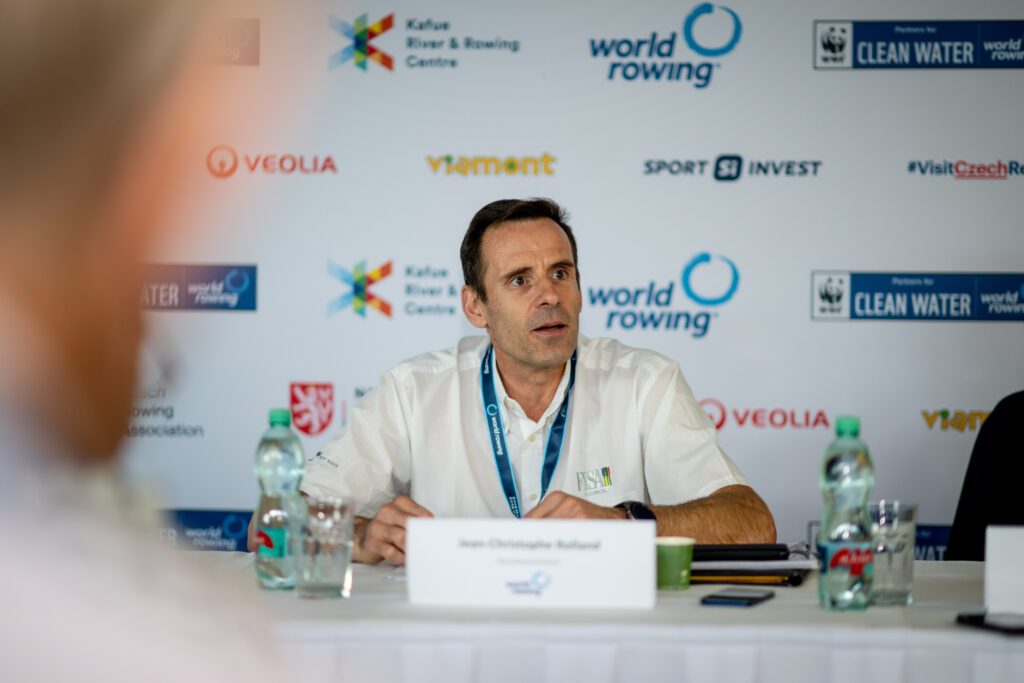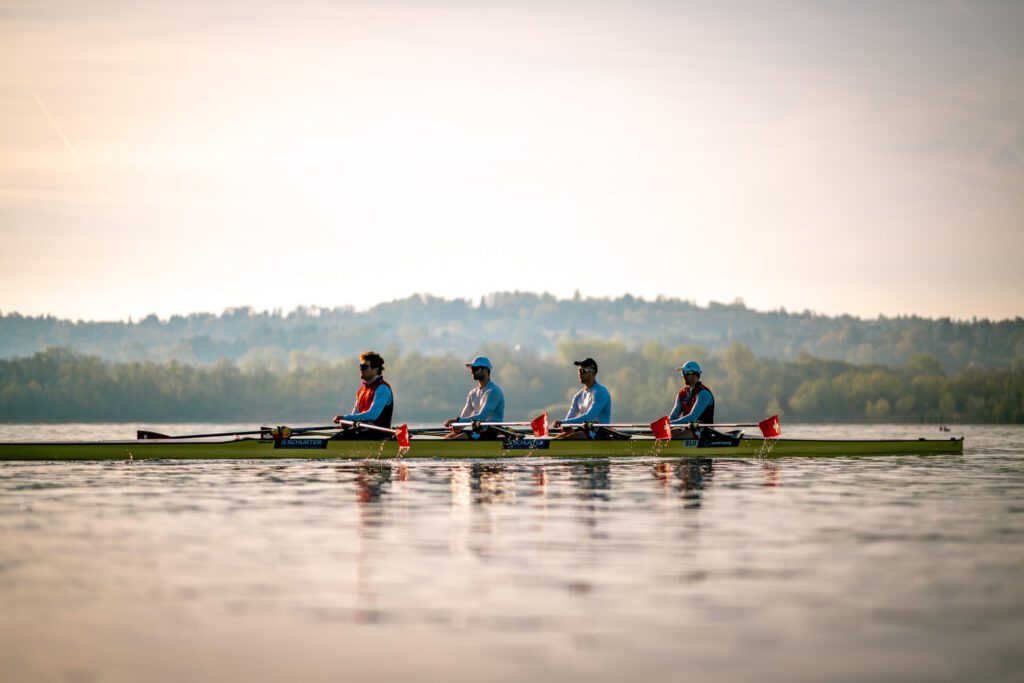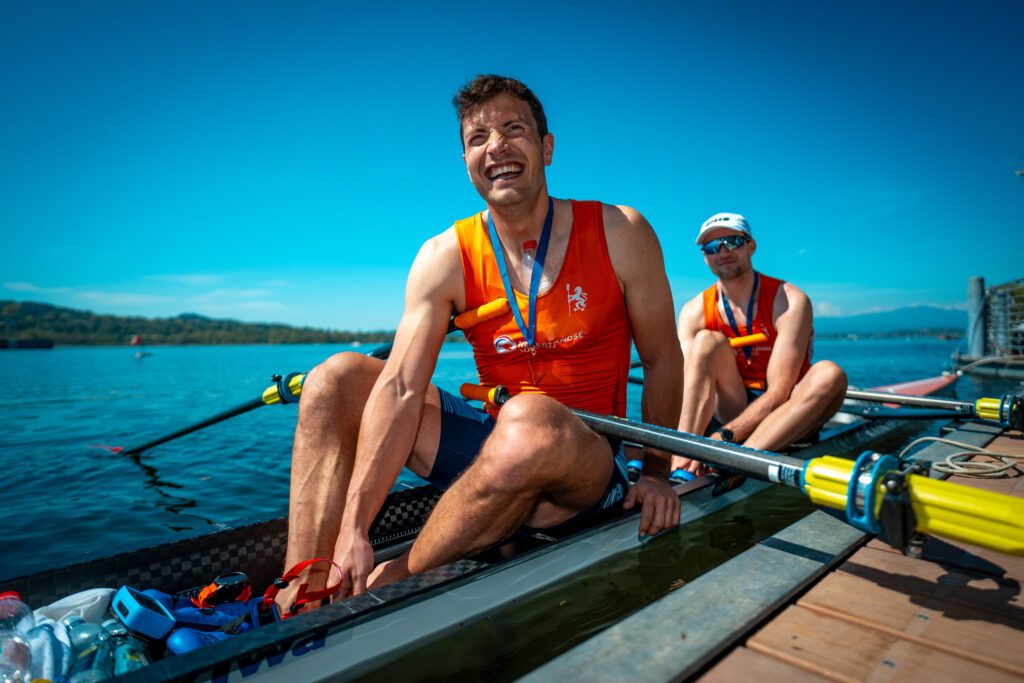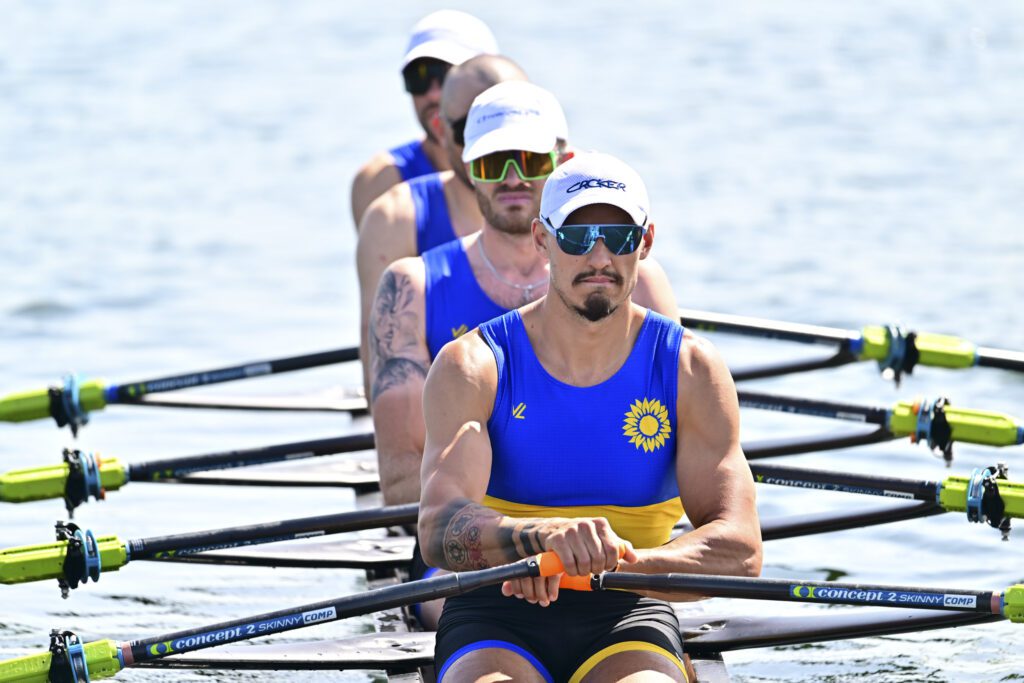Most years the media is invited to question World Rowing’s top people at a press conference during the world championships. Holding the first of these since the pandemic, the Tokyo Games and the arrival of a new executive director (ED) to replace the long-serving Matt Smith, President Jean-Christophe Rolland was in upbeat but earnest mood beside the new ED, Vincent Gaillard.

Photo World Rowing President Jean-Christophe Rolland
Credit Benedict Tufnell
His first racing season has been rather a baptism of fire for Gaillard, despite having Smith’s support. The invasion of Ukraine, the persistence of Covid worries and assigned host cities starting to consider withdrawing from future events due to financial and political worries, have given the last eight months an uncertain air for the sport’s governing body.
As Rolland explained, nobody expected the war in Ukraine to go on this long. “We had to act in a crisis mode, but importantly we had a joint approach with the world of sport”. That approach, supported by the IOC and IPC, was to ban athletes and officials from Russia and its funder Belarus from any participation in World Rowing events. “Decisions will obviously be reviewed if the situation evolves,” said Rolland. “Up ’til now unfortunately the situation has not evolved so this decision is going on.” Meanwhile the Russian and Belarusian federations have appealed the ban to CAS, the Court of Arbitration for Sport, and the case will be heard on 23rd November this year. Appeals for a provisional suspension of such bans in other sports were rejected by CAS earlier in the year, but one of the CAS arbitrators, Belarusian former kayaker and lawyer Aliaksandr Danilevich, was arrested by Belarus police in July after he co-signed a plea for the immediate end to hostilities in Ukraine.
On the intertwined matters of beach sprint rowing and lightweight rowing at the Olympics, Rolland explained that the IOC has introduced a new timepoint for decisions. In the past previous sports have been confirmed seven years before a given Games, and then new disciplines and events decided in the December four years before that Games will take place. But as with beach sprint rowing, sometimes new disciplines would need considerable planning because they and their continental qualification events would need to take place at very different types of venues from the original sport. (Think about the difference between track cycling and BMX freestyle as an example.)
The seven-year sports confirmation (in 2021) remains and rowing is in. But in an extra step the IOC now plans to announce which new sports and new disciplines will be included in the LA 2028 Olympics during the third quarter of 2023, and after that the actual events (e.g., M2x, LW2x etc.) and number of athletes permitted per sport will not be confirmed until December 2024 after the Paris Olympics and Paralympics.
“my aim is that when I am retired, we continue to have our sport as one of the major Olympic sports”
Jean-Christophe Rolland
After a lengthy consultation process before 2020, World Rowing decided to back beach sprints (rather than both beach and coastal disciplines) as the discipline they most wished to pursue at the Olympic level, on the expectation that lightweights would be removed due to the IOC advisors considering weight categories inappropriate for all sports except weightlifting and boxing. Beach sprint rowing was not approved for Paris 2024 due to cost, complexity and logistics, but that granted lightweight rowing a brief reprieve, however it is likely that lightweight rowing will finally be removed in Los Angeles especially if beach sprints are approved next summer. “In less than one year now we should already know which will give us and our member federations a little bit more time to prepare for Los Angeles 28 Games should we be included with the additional discipline”, explained Rolland. World Rowing has submitted a lengthy questionnaire about adding beach sprint rowing, which will be evaluated on six themes, the most important of which Rolland says is “cost and complexity, optimisation. They really push to reduce the complexity to organise the Olympic Games. I do believe that we have a very strong case.”
What World Rowing could not find before 2020 was a good reason to change the IOC’s mind about removing lightweight rowing. “There was no argument which would make the IOC change its position. So we moved from this defensive mode, because we could not find a good argument, to a proactive position. OK so [the IOC] doesn’t want lightweight rowing. We have a new discipline which can reach new audiences, new countries. Now we do everything in our hands to make [beach sprint rowing] happen, and as rowers we won’t give up until the very last stroke.” (He didn’t say, but it is true, that it’s sheer luck that lightweights were handed another four years for reasons outside World Rowing’s control. They are not likely to be lucky again when the LA decisions are made). Meanwhile beach sprint rowing will be included in the World Beach Games in Bali 2023, in the Youth Olympic Games in Dakar in 2026. “The whole point is to make sure the discipline works on every type of coast,” said Gaillard. “And on lakes – certain lakes might very well be suitable for the discipline, so to make it as versatile and agile as possible.” But this is not expected to adversely affect standard rowing. “This will not be to the detriment of what we have here”, said Rolland. “It is about enlarging the base of the pyramid.”
The matter of the LA 2028 rowing course is also much on World Rowing’s mind. The Los Angeles course is limited to 1500 metres due to infrastructure restrictions on the site, the World Rowing executive has consulted stakeholders and decided not to adjust competitions before that. “On this the approach was to really make the Olympic and Paralympic regattas as unique in terms of the distance”, said Rolland. “We don’t change the sport of rowing at all: we adapt to a very specific situation in Los Angeles. Our intention is to limit the 1500m to the Los Angeles [Olympic] course. That means the year before, qualification at the world championships in 2027, and at the continental qualification regattas, our sport remains on 2000m.”
Meanwhile Gaillard has a delayed review of the world championships events to conduct next year, now that there will be accurate data from this 2022 event, and intends to diversify sources of World Rowing revenue commercially and work on relationships with rowing manufacturers, so he will have a busy second year.
All these challenges, and World Rowing’s decisions on them, reflect Rolland’s opening remarks. “As the governing body of the sport of rowing, we have always the same vision to ensure the best future for our sport. We have to make decisions which have an impact on the future of our sport, he said. “Not just for tomorrow but for after tomorrow. Our organisation is athlete-focused, but when we say [that] it is the athletes of today but as importantly if not more importantly the athletes of tomorrow. They will also want to go to the Olympics, will also want to have great events. That is what feeds our discussion and negotiation with the IOC because my aim is that when I am retired, we continue to have our sport as one of the major Olympic sports.” He has always been clear that this means not everyone in the sport will get what they want, and that changes forced on rowing externally will mean compromises have to be made.



